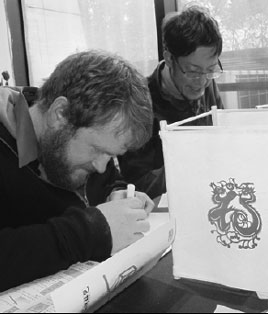What's new
Updated: 2014-02-22 07:56
(China Daily)
|
|||||||||||
History lessons for expats

Some 100 foreign consuls general, representatives from foreign firms and foreign teachers in Sichuan province recently visited the Jinsha Site Museum in Chengdu, Sichuan province, at the invitation of the Sichuan Provincial Association of Friendship with Foreign Countries. They attended a lecture on early history and culture of the Chengdu Plain given by Jiang Zhanghua, a famous archaeologist and deputy curator of the Chengdu Museum, and learned how to make rice dumplings and lanterns. The Sichuan Provincial Association of Friendship with Foreign Countries has been sponsoring visits to one historical site a year for expatriates in Sichuan, said Qiu Yihe, director of the department of foreign cultural exchanges in the association.
Hobbit is back
The Hobbit: The Desolation of Smaug, the second film of the Hobbit series, started screening in China from Feb 21. The movie, adapted from J.R.R Tolkien's novel created in 1937, depicts home-loving hobbit Bilbo Baggins' adventure through wilderness and his quest for treasure guarded by a dragon called Smaug. The Chinese market contributed about one-third of the global box office of The Hobbit: An Unexpected Journey, the first film of the franchise. In the first 10 days of its screening in China last February, it made 250 million yuan ($39 million). The new film's major attractions are actors Martin Freeman as Bilbo Baggins and Benedict Cumberbatch, the voice of Smaug. The two are popular in China for starring in the British TV drama Sherlock. The latest installment topped the box office in North America and France in December.
China's quota of imported films from Hollywood remains unchanged at 34 this year, according to an official from the State Administration of Press, Publication, Radio, Film and Television.
Altar relics found
Chinese archaeologists have discovered altar relics at the ruins of a neolithic city, which indicate religious culture at that time. An initial survey showed that the 8-meter-high altar had a three-tiered structure with a stone base 90 meters long. Jade relics and pits for offerings as deep as 3 meters were found nearby, said Sun Zhouyong, deputy head of the Shaanxi Provincial Institute of Archaeology on Thursday. Excavation has not started at the altar, outside the walls of the Shimao Ruins in Shenmu county. Archaeologists have collected some jade for further research. They excavated more than 80 human skulls last year. Shimao Ruins were discovered in 1976 , but archaeologists did not conduct a thorough survey until last year, which led to more discoveries. The city was built about 4,300 years ago and abandoned roughly 300 years later during the Xia Dynasty (2100-1600 BC), the first dynasty in China described in historical chronicles.
Documentary on Unit 731
Filming of a documentary about the atrocities of Japan's notorious Unit 731 during World War II began in the northeastern Chinese city of Harbin on Wednesday. The documentary titled 731 will interview witnesses and scholars as well as unveil historical archives. The documentary, consisting of five 60 - minute episodes, will be jointly shot by the Harbin municipal government and China Central Television. It is expected to be broadcast by the end of the year. Unit 731 was a top-secret biological and chemical warfare research base established in Harbin in 1935, serving as the nerve center of Japan's biological warfare in China and Southeast Asia during WWII. At least 3,000 people were killed in experiments on humans at Unit 731. Civilians and prisoners of war from China, the former Soviet Union, the Korean Peninsula and Mongolia perished at the hands of the Japanese. The retreating Japanese invaders blew up the base when the Soviet Union army took Harbin in 1945.
China Daily - Xinhua
(China Daily 02/22/2014 page11)
Today's Top News
China strongly opposes Obama-Dalai meeting
Tax refunds to lure overseas tourists
Prosecutors tackle food crimes
Year of Horse bringing baby boom
China firmly opposes Obama-Dalai meeting
Biden warns of Ukraine sanctions
Top advisory body prepares for session
Poly Culture plans IPO in HK
Hot Topics
Lunar probe , China growth forecasts, Emission rules get tougher, China seen through 'colored lens', International board,
Editor's Picks

|

|

|

|

|

|





